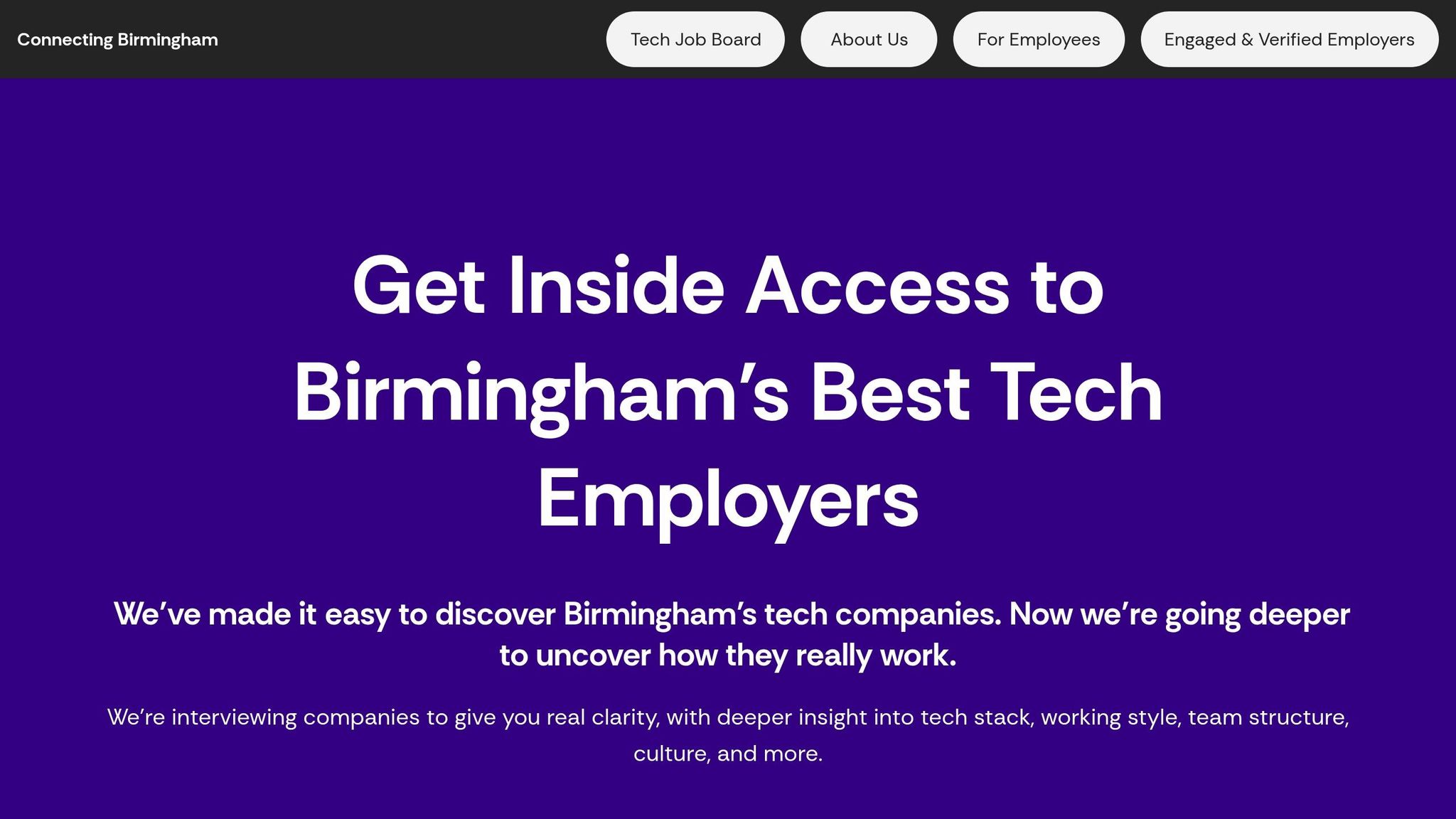Birmingham’s tech industry is growing fast, but many local residents are being left behind. Socioeconomic challenges like poverty, limited education access, and financial constraints are blocking talented individuals from entering the tech workforce. This not only affects job seekers but also creates a hiring gap for employers.
Key issues include:
- Poverty and unemployment: Birmingham's city poverty rate is 25.2%, with median earnings of £22,000, far below the metro average.
- Education gaps: State schools often lack tech resources, while private schools provide better opportunities. Internships and higher education remain unaffordable for many.
- Financial barriers: Costs like commuting, childcare, and tech tools make it harder for disadvantaged residents to compete.
- Lack of networks: Without connections or mentorship, many struggle to navigate tech hiring processes.
Efforts to address these barriers include free skills courses, paid apprenticeships, and mentorship programmes. Employers are also shifting to skills-based hiring and using platforms like Connecting Birmingham to reach untapped talent.
The solution lies in collaboration between companies, local authorities, and communities to ensure Birmingham’s tech sector reflects its diverse population.
The Right Chamber - Ep 20 Opening doors for the people of Dudley
Main Socioeconomic Barriers in Tech and Marketing Recruitment
Birmingham's tech and marketing sectors face long-standing socioeconomic challenges that limit opportunities for job seekers from disadvantaged backgrounds. These barriers also make it harder for employers to build diverse teams. Below, we explore how education, financial constraints, and societal perceptions contribute to these challenges.
Education and Professional Networks
Access to quality education and professional networks is a major hurdle. Many lower-income residents in Birmingham attend schools that lack modern computing resources or extracurricular programmes focused on tech. In contrast, private schools and well-funded academies often provide industry partnerships, giving their students a head start with in-demand skills.
Higher education and internships present another challenge. Pursuing a computer science degree at a reputable university comes with significant costs, making it inaccessible for many talented individuals from working-class backgrounds. Even unpaid or low-paid internships - often a stepping stone into the industry - are out of reach for those who cannot afford to work without a steady income.
Networking is another invisible barrier. The tech industry often relies on personal connections and referrals, leaving those without established networks at a disadvantage. While some candidates benefit from mentorship and insider advice, others struggle to gain even basic industry insights.
The skills gap goes beyond formal qualifications. Many entry-level tech roles require familiarity with programming languages or digital marketing tools. While some can afford bootcamps or online courses to bridge this gap, others lack the financial resources or even reliable internet access needed for self-learning.
Financial and Location Constraints
Economic factors further compound the issue. Limited transport options make it difficult for residents in outer areas of Birmingham to commute to tech hubs concentrated in the city centre. Public transport can be expensive, and for those on tight budgets, regular commuting becomes a significant challenge.
Relocation costs add another layer of difficulty. Even moving within Birmingham can involve hefty expenses like deposits and removal fees. For residents in social housing or those with limited financial flexibility, relocating closer to job opportunities may not be an option.
Childcare responsibilities disproportionately affect women from lower-income backgrounds. The tech industry's long hours, irregular schedules, and networking events often clash with the realities of securing affordable childcare, creating another significant barrier.
Access to essential tools is another issue. Tech and digital marketing roles often require reliable laptops, high-speed internet, and specialised software. Without these resources, many candidates are unable to develop the skills they need to compete effectively.
Confidence and Perception Issues
Psychological and cultural factors also play a role. Imposter syndrome is common in professional environments, but it can be particularly pronounced for individuals from working-class backgrounds. The tech industry's emphasis on elite educational credentials and self-promotion often amplifies feelings of inadequacy.
Cultural differences can subtly affect career progression. The industry’s focus on risk-taking and entrepreneurial thinking may feel at odds with values that prioritise stability, making interviews and networking events intimidating for some.
Stereotypes also shape career aspirations. Societal messages that suggest tech careers are "not for people like them" can discourage individuals from disadvantaged backgrounds from pursuing opportunities in the field. This self-doubt can lead to hesitation, with candidates waiting until they meet every single job requirement before applying. Meanwhile, those with stronger networks often apply with less certainty, knowing that job listings describe ideal, not mandatory, qualifications.
These intertwined challenges create systemic barriers that not only hinder entry into Birmingham's tech and marketing sectors but also limit career growth. The result? A missed opportunity for individuals and a loss of potential for Birmingham's economy as a whole.
How Socioeconomic Barriers Affect Career Growth
Even after landing a role in Birmingham’s tech sector, socioeconomic barriers can continue to hold individuals back. These obstacles can influence promotion opportunities, representation in leadership, and overall job stability. Let’s break down how these barriers impact leadership roles, career progression, and job security.
Leadership Role Representation
Leadership positions in Birmingham’s tech and marketing industries are often dominated by those from more privileged backgrounds. This creates a gap in relatable role models for employees from less advantaged circumstances. Without leaders who share or understand their challenges, it becomes harder for individuals to see a clear path to senior roles, dampening their aspirations and confidence.
Career Advancement Challenges
Climbing the ladder in tech often depends on unwritten rules, informal networks, and access to mentorship. For those without established connections, navigating these systems can be daunting. Additionally, corporate cultures that prioritise self-promotion and visibility can unintentionally sideline individuals who may not be as familiar or comfortable with these practices. This leaves many talented employees overlooked for promotions.
Economic Pressures and Job Security
Financial pressures can also limit career growth. When immediate job security takes precedence, individuals are less likely to take risks or invest in their professional development. This short-term focus, driven by economic necessity, often means passing up opportunities that could lead to greater advancement in the long run.
sbb-itb-1ad140f
Current Efforts to Address Socioeconomic Barriers
Birmingham is taking active steps to create a more level playing field in tech hiring. These efforts include government and council-led programmes, initiatives by local companies to promote diversity and inclusion, and dedicated platforms connecting job seekers with opportunities in the tech sector.
Government and Council Programmes
Local authorities are working to break down financial and skill-based barriers by offering free digital skills courses, paid apprenticeships under the #WM2041 initiative, and targeted support like CV workshops and interview preparation sessions. These programmes focus on equipping individuals with practical, job-ready skills rather than relying solely on traditional academic qualifications. This approach is designed to make tech careers more accessible to residents from low-income backgrounds. To complement these public efforts, private companies are also stepping up to improve diversity in their hiring practices.
Company-Led Diversity and Inclusion Efforts
Birmingham's tech companies are rethinking their recruitment strategies to attract talent from a broader range of backgrounds. Many are adopting skills-based hiring, which places greater emphasis on practical abilities over formal education. Mentorship programmes are also on the rise, pairing junior employees from underrepresented groups with seasoned professionals to help them navigate their careers. Paid apprenticeships have gained traction as well, allowing individuals to earn a salary while learning the ropes, which helps to ease financial burdens. Additionally, businesses are revising their recruitment processes to minimise bias - measures like blind CV reviews, reducing academic prerequisites, and assembling diverse interview panels are becoming the norm.
Connecting Birmingham's Role in Bridging the Gap

Connecting Birmingham is a vital resource in tackling socioeconomic barriers within the local tech scene. The platform provides job seekers with access to tailored job listings, verified company profiles, and detailed insights into company culture, team dynamics, and work environments. Its tools, such as research features and job alerts, empower candidates - particularly those without established professional networks - to craft well-informed applications and prepare effectively for interviews. By offering these resources, Connecting Birmingham helps level the playing field for those seeking tech opportunities.
How to Improve Socioeconomic Diversity in Birmingham Tech Hiring
Addressing the barriers to diversity in tech hiring requires a collaborative effort. Employers, policymakers, and community leaders must come together to create a tech sector that truly reflects Birmingham's varied population.
Expanding Access Through Skills-Based Recruitment
To open doors for a wider range of candidates, employers need to prioritise skills over formal qualifications. By eliminating unnecessary degree requirements, they can focus on assessing practical abilities through methods like coding tests, portfolio reviews, or trial projects.
Interviews should shift towards evaluating problem-solving skills instead of academic accolades. Structured interviews that use real-world scenarios allow candidates to showcase their potential without being judged on formal education or polished presentation skills, which often favour those from more privileged backgrounds.
Apprenticeship programmes are another effective way to widen access. These paid learning opportunities, paired with clear career progression paths, help candidates envision a future within the organisation and build confidence in their abilities.
Salary transparency is equally important. By advertising clear salary bands, employers can level the playing field. This approach particularly helps candidates from lower-income backgrounds who might undervalue their skills or shy away from negotiating.
Of course, hiring reforms alone aren’t enough. Outreach and mentorship programmes are essential for reaching and supporting underrepresented groups.
Better Outreach and Mentorship Programmes
Reaching underrepresented talent requires proactive community engagement. Tech companies in Birmingham should build connections with local schools, colleges, and community groups in deprived areas. Instead of relying solely on university career fairs, they should expand their efforts to include further education colleges, adult learning centres, and grassroots organisations.
Mentorship programmes can play a key role in guiding candidates. Cross-company mentoring initiatives are especially valuable, offering broader industry insights while spreading the resource burden across multiple employers. These programmes are most effective when they include practical support, such as CV writing, interview preparation, and networking opportunities.
Early engagement with schools can also break down barriers before they become entrenched. Companies can sponsor coding clubs, organise workplace visits, or invite speakers to share diverse career journeys. These activities help young people from all backgrounds see tech as an attainable career path.
Community-led initiatives deserve special attention. Grassroots organisations often have a stronger understanding of local challenges and deeper connections with underrepresented communities. By providing funding, volunteer hours, or even offering facilities for training sessions, companies can amplify these efforts and create meaningful change.
Together, these efforts can open up new opportunities and build stronger community ties.
Using Platforms Like Connecting Birmingham
Local platforms such as Connecting Birmingham are vital for levelling the playing field in tech recruitment. The platform's verified company profiles give candidates insights into potential employers, shedding light on culture and team dynamics. This transparency is especially valuable for those who lack professional networks to provide insider knowledge.
Features like job alerts and research tools ensure that opportunities reach a wider audience, including those who may not have the time or resources to actively search for openings. These tools are particularly helpful for candidates juggling responsibilities like childcare or multiple jobs.
By focusing on local tech companies, Connecting Birmingham also addresses geographical challenges. Highlighting opportunities within the city reduces the need for costly relocations, which can exclude candidates from lower-income backgrounds. Additionally, this local focus helps smaller Birmingham-based companies compete for talent alongside larger organisations with bigger recruitment budgets.
Platforms like these are instrumental in making tech opportunities more accessible, helping to bridge the gap for candidates who might otherwise be overlooked.
Conclusion: Building a More Diverse Tech Sector in Birmingham
Birmingham's tech industry stands at a critical juncture. The research highlights how socioeconomic barriers continue to limit opportunities, preventing the sector from fully leveraging the wealth of talent within the city. These challenges don’t just hinder individual careers - they stifle the industry's ability to thrive on diverse ideas and fresh perspectives.
To address these issues, the path forward demands a unified effort. Employers, government bodies, and the tech community must all play their part. Employers need to adopt skills-based hiring practices that go beyond traditional qualifications. Government initiatives and council programmes require sustained backing and further expansion. Meanwhile, the tech community has a responsibility to champion inclusive hiring practices that open doors for underrepresented groups.
Improving access through transparent job listings and verified company profiles is a practical step forward. This not only helps candidates navigate opportunities more effectively but also complements the broader diversity initiatives already underway. By focusing on Birmingham-based companies, these efforts tackle the localised challenges faced by individuals from lower-income backgrounds.
A diverse workforce isn't just a moral imperative - it’s a business advantage. It fuels creative problem-solving and ensures businesses can meet the needs of a varied customer base. For Birmingham to cement its position as a leading tech hub, it must draw on the full breadth of talent its communities have to offer. This aligns with earlier findings that underscore how diversity fosters innovation within the sector.
The groundwork for meaningful change is already in place. By fostering collaboration between employers, community organisations, and platforms designed to bridge gaps, Birmingham has the potential to create a tech sector that mirrors its rich and varied population. The real challenge isn't deciding whether this transformation is needed - it’s about how quickly the industry can make it a reality.
FAQs
What can Birmingham's tech companies do to address socioeconomic barriers in hiring?
To address socioeconomic barriers in recruitment, tech companies in Birmingham could implement blind CV reviews, structured interviews, and skills-based assessments. These approaches help reduce bias in hiring decisions, ensuring candidates are evaluated on their abilities rather than their background.
Providing fully paid internships and apprenticeships is another effective way to create opportunities for individuals from underrepresented groups. This not only supports social mobility but also ensures equal access to career pathways in tech.
By connecting with a broader range of talent and offering clear, accessible entry points into the industry, businesses can contribute to shaping a tech sector in Birmingham that reflects the diversity of its community.
How can mentorship programmes and skills-based recruitment address barriers for underrepresented groups in Birmingham's tech sector?
Mentorship programmes and skills-focused recruitment are making a big difference in opening doors for underrepresented groups in Birmingham's tech scene. Mentorship provides more than just advice - it connects individuals with valuable networks, builds essential skills, and helps them navigate challenges often tied to socioeconomic barriers. This kind of support can be transformative, boosting both confidence and career opportunities.
On the other hand, skills-based recruitment shifts the focus from traditional qualifications to what candidates can actually do. By valuing abilities and practical experience over degrees or certifications, this hiring approach creates a more inclusive process. It gives people from diverse backgrounds a real shot at success. Together, these efforts are helping to create a tech industry in Birmingham that’s fairer and more accessible for everyone.
How does Connecting Birmingham help make tech jobs more accessible to underrepresented groups?
Connecting Birmingham is making strides in addressing the challenges faced by underrepresented groups in the local tech scene. Through its platform, which features verified company profiles, job opportunities, and insights into workplace culture, it gives job seekers the tools to make informed decisions and link up with trusted employers.
Beyond job connections, the platform also backs initiatives focused on boosting digital inclusion and skill-building. These efforts aim to close the socioeconomic gap, opening doors for individuals from disadvantaged backgrounds to thrive in Birmingham's expanding tech industry.


